- Slots
- Blackjack
- Roulette
- Live Dealer
- Baccarat
- Great selection of slots
- High-quality live dealer games
- Excellent welcome bonus
- Crypto-friendly
Betonline.ag
- Slots
- Blackjack
- Roulette
- Live Dealer
- Baccarat
- Licensed in Panama
- Great brand reputation
- Multiple gaming options
- Wide range of payment methods
- Slots
- Blackjack
- Roulette
- Live Dealer
- Baccarat
- 300+ games
- Crypto-friendly casino
- Live dealer jackpot
- Bonus galore for different verticals

Stay with us to learn not only the difference between the two hands but also the basic blackjack strategy involving soft hands, which, in turn, can help you decrease the house edge and improve your chances of winning.
Soft vs. Hard Hand
Differentiating between hard and soft hands is key to mastering the blackjack game. A hard hand in blackjack is any hand that doesn’t feature an ace, or if it does, an ace is counted as a 1. For example, a hand with an ace, a 6, and a 10 is counted as 17. If we were to count the ace as 11, the hand would go over the 21 limit.
Contrary to the hard hand stands a soft hand. This hand also features an ace, only this time, it can be counted as either 1 or 11, depending on your preference.
Of course, during the course of the game, soft hands tend to transform into hard hands, depending on the hands drawn. For example, you can start the hand with an ace and a 4, which can either be 5 or 15. However, you decide to hit and now land a Queen, which changes things drastically. You now have a hard 15 total; otherwise, you’d go bust.
Soft Hand Defined
Let’s define a soft hand in blackjack in more detail and provide an overview of possible blackjack soft hands.
Namely, any hand where an ace can be counted as 11 is a soft hand. With such a hand, you can adjust the total depending on your strategy and situation.
The biggest advantage of a soft hand lies in the fact that you can never go bust on the next hit.
Here’s an example.
- Say you are dealt an ace and a 5. That’s a soft 16.
- If the dealer’s up card is a strong one, say a 9, you can decide to hit to better your hand.
- If you draw a Jack, you won’t go bust but rather turn the value of your hand into a hard 16.
The possible soft hand goes from soft 13 to a soft hand valued at 19+. Each possible combination of the soft hand implies a different follow-up move with respect to the dealer’s up card.
How to Play a Blackjack Soft Hand
Thanks to the flexibility and berth that comes with a soft hand, you always have multiple play options and leeway for a more aggressive playing style. In the basic strategy chart, you will see the proposed moves for all soft hand combinations, also considering the dealer’s upcard.

Also, we have to consider the rules for the dealer heating on a total of 17. Namely, in most blackjack variants, the dealer must hit if he has a 16 or below. Also, the dealer must stand on all 17.
However, there are games with the hard 17 rule. This rule means that the dealer is required to hit and draw more cards if they hold a soft 17, which can result in blackjack for the dealer. This rule improves the house edge by 0.22% and is thus unfavorable for the player.
Let’s see how you should play different soft hands.
Soft 13 or 14
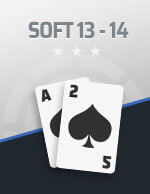 If you are dealt a soft 13 or 14 hand, and the dealer’s up card is a 5 or 6, you should always double down. A dealer’s hand with a 5 or a 6 is statistically the worst hand a dealer can have.
If you are dealt a soft 13 or 14 hand, and the dealer’s up card is a 5 or 6, you should always double down. A dealer’s hand with a 5 or a 6 is statistically the worst hand a dealer can have.
In all likelihood, and considering the number of 10s in play, the dealer will have to hit and probably get 15 or 16. In that case, the dealer will hit again and probably go bust.
Even if the dealer doesn’t get a 5 or a 6, and you have a soft 13 or 14 hand, you should take a hit. Your hand structure means you won’t go bust on the first hit, so there’s no damage.
Soft 15 or 16
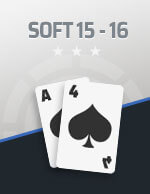 You should always double down when you have a soft 15 or a soft 16 hand and the dealer’s upcard is 4, 5, or a 6. The reasoning behind this move is simple. It also has to do with how many 10s are in play. If the dealer’s hole card is a 10, the dealer will have to hit again and thus increase his probability of going bust.
You should always double down when you have a soft 15 or a soft 16 hand and the dealer’s upcard is 4, 5, or a 6. The reasoning behind this move is simple. It also has to do with how many 10s are in play. If the dealer’s hole card is a 10, the dealer will have to hit again and thus increase his probability of going bust.
You should also hit if you have these soft hands and the dealer is showing something else because you won’t go bust on the first hit either way, and it can only increase your chances of coming up with a better hand.
Soft 17
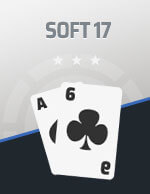 The best option for a soft 17 hand and the dealer’s upcard within a 3 to 6 range is to double down.
The best option for a soft 17 hand and the dealer’s upcard within a 3 to 6 range is to double down.
Like in previous cases, the dealer has a greater chance of going bust than coming up with a blackjack. If the dealer’s upcard is showing anything else, you should always hit.
Soft 18
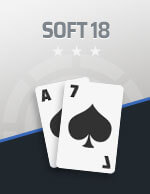 The strategy for playing a soft 18 hand is the trickiest. It offers you three choices.
The strategy for playing a soft 18 hand is the trickiest. It offers you three choices.
First, like in the previous moves, you should always double down when the dealer’s upcard is between 3 and 6. In essence, an 18 total is already a pretty good hand, so you stand a good chance of winning.
You should hit if the dealer’s upcard is showing a 9, a 10, or an ace. With these upcards, the dealer will have a good chance of hitting a 10 and beating your 18, so try to improve your hand. Remember, with a soft 18 hand, and you won’t go bust on at least one hit.
The third outcome is related to the dealer’s upcard being within the 2–8 range.
Mathematically, there is a good chance for the hole card to be a 10, in which case, the dealer will likely go bust with the hand total of 12, lose to your hand with a total of 17, and at best, get a push for a hand total of 18. The crucial part here is that you won’t use your bet.
Soft 19-21
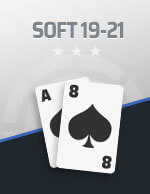 If you already get a hand with totals between 19 and 21, you already have a strong hand, so there’s no need to risk it.
If you already get a hand with totals between 19 and 21, you already have a strong hand, so there’s no need to risk it.
The chances of you improving the hand are not great, so simply stand and wait to see what the dealer has to show.
Conclusion
Landing a soft hand implies two possible moves — you either double down or hit, depending on the dealer’s upcard. Learning these proposed moves can increase the chances of beating the dealer and lowering the house edge.
Of course, the basis of this strategy is the basic blackjack strategy, so make sure to check it out and learn how it can benefit your game.
FAQ
- 21+3 Blackjack
- 6:5 Blackjack
- Advanced Strategy
- Atlantic City Blackjack
- Blackjack Bankroll Management
- Blackjack Etiquette
- Blackjack for Beginners
- Blackjack Odds and Probability
- Blackjack Strategy Simulator
- Blackjack Switch
- Blackjack Terminology
- Blackjack Tournaments
- Blackjack vs. Pontoon
- Blackjack: Online vs. Offline
- Bonus
- Card Counting
- Card Counting Hi-Lo
- Dealer’s Up Card
- Double Attack
- Double Down
- Double Exposure Blackjack
- European
- Face-Up vs. Face Down
- Hard vs. Soft Hands in Blackjack
- Hit or Stand
- Hole Carding
- House Edge
- How to Win
- How to Win Live Blackjack
- Insurance
- Is Online Blackjack Legal in the US?
- Lucky Ladies Side Bet
- Mobile Blackjack
- Multi Deck
- Online Blackjack Rigged
- Online Blackjack vs. Live Blackjack
- Online Strategy
- Perfect Pairs
- Power Blackjack
- Progressive Betting
- Real Money Blackjack
- Rules
- Side Bets
- Single Deck
- Soft 17 in Blackjack
- Spanish 21
- Splitting
- Strategy
- Strategy Charts
- Surrender
- Variations
- Zappit



